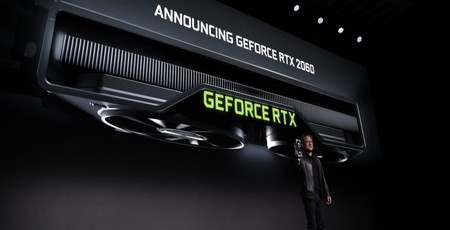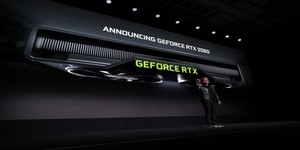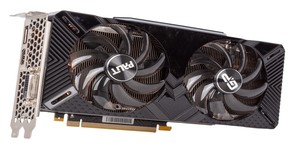Nvidia announces GeForce RTX 2060
January 7, 2019 | 11:27

Nvidia has announced the launch of its GeForce RTX 2060 graphics card family, new Turing-based RTX-capable laptop models, and partial support for running AMD FreeSync monitors - referred to under their cross-vendor Adaptive Sync terminology - from Nvidia graphics cards.
One of the missing pieces in the GeForce RTX puzzle, Nvidia's GeForce RTX 2060 graphics card family is designed to bring the high-priced Turing architecture to a wider market. Launching, Nvidia founder and chief executive officer Jensen Huang announced during his keynote presentation at the Consumer Electronics Show 2019 (CES 2019), on January 15th with a US recommended retail price of $349 (excluding tax), which will translate to £329 (including VAT) in the UK, the GeForce RTX 2060 is claimed to offer a 60 percent performance uplift over the last-generation GeForce GTX 1060 and includes the RTX-centric RT and Tensor Core hardware for ray tracing and deep learning workloads - capable, Huang claims, of running Battlefield V with ray tracing enabled at 60 frames per second.
'Next-gen gaming starts today for tens of millions of gamers everywhere,' claimed Huang during his keynote speech. 'Desktop gamers are demanding, and the RTX 2060 sets a new standard — an unbeatable price, extraordinary performance and real-time ray tracing that blurs the distinction between movies and games. This is a great moment for gamers and our industry.'
The GeForce RTX 2060 includes 6GB of GDDR6 graphics memory, while the Turing GPU has 1,920 CUDA Cores, 240 Tensor Cores (delivering 52 trillion floating point operations per second (teraflops) of computing performance), and 30 RT Cores enabled. The company has also confirmed that buyers of the new card will receive their choice of Anthem or Battlefield V as a free game, while hardware partners releasing both stock and pre-overclocked models include Asus, Colorful, EVGA, Gainward, Galaxy, Gigabyte, Innovision 3D, MSI, Palit, PNY, and Zotac. Nvidia has also confirmed it will release a Founders Edition of its own.
Interestingly, Nvidia has also issued the first tacit admission that its high-priced G-Sync variable refresh rate technology - which requires special circuitry driven by a field-programmable gate array (FPGA) to be installed in the monitor - may not be the way forward by announcing that it will begin supporting rival AMD's FreeSync technology, referred to by its VESA-certified Adaptive Sync nomenclature, in its GeForce graphics cards for the first time. Support, however, will be limited to those monitors which have passed Nvidia's internal testing - a mere 12 out of 400 tested so far, the company claims - while power users will be able to force Adaptive Sync on non-certified displays.
At the same time, Huang unveiled GeForce RTX 2080-, RTX 2070-, and RTX 2060-based laptops which were claimed to be 'twice as fast as a PlayStation Pro'. Aimed at both gaming and content creation, including a partnership with OBS for 'pro-quality brodcast streaming on a single PC,' the Turing GPUs will be arriving in more than 40 laptop designs with 17 using Nvidia's Max-Q cooling design to reduce operating noise and size and 'many' using Optimus to toggle between low-power iGPU and high-power dGPU components.
'Laptops are the fastest growing gaming platform — and just getting started,' claimed Huang. 'The world’s top OEMs are using Turing to bring next-generation console performance to thin, sleek laptops that gamers can take anywhere. Hundreds of millions of people worldwide — an entire generation — are growing up gaming. I can’t wait for them to experience this new wave of laptops.'
The first GeForce RTX-based laptops will launch on January 29th, Huang confirmed, with pricing yet to be announced.

MSI MPG Velox 100R Chassis Review
October 14 2021 | 15:04








Want to comment? Please log in.